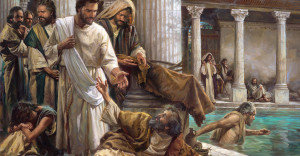The Bible teaches us that Noah was saved by grace. “And the Lord said, I will destroy man whom I have created from the face of the earth; both man, and beast, and the creeping thing, and the fowls of the air; for it repenteth me that I have made them. But Noah found grace in the eyes of the Lord” (Gen. 6:7,8). Those who deny this surely must be counted as those who deny the scriptures.
Yet, equally undeniable is the fact that if Noah had not built the ark as God had commanded he would have drowned in the waters of the flood just as surely as the rest of sinful humanity did (Heb. 11:7). Could Noah have conceived by himself and built of his own volition an ark that could have saved himself and his family if God had not authorized it? No. But neither could he be saved if he had not obeyed God’s commands and followed His instructions implicitly. The Lord is telling us in this account that being saved by grace of necessity involves works of obedience.
What many do not want to acknowledge, or at least fail to understand, is that all works are not works of merit. Did Noah earn his salvation? Certainly not. But did Noah have to work in order to be saved? Absolutely! Noah’s works were not works of merit but works of obedience.
There are different kinds of works mentioned in the Bible. First, there are works of disobedience. Jesus will tell those who profess to do “many wonderful works” but who do not follow the Lord’s will that they “work iniquity” (Matt. 7:23). Others do works that “deny Him” (Tit. 1:16). These are all works, but they are works of disobedience. They will not save anyone but will cause one to be lost.
Second, there are the works of the law of Moses. These are the works that are generally referred to in the Bible when it is said that we are not saved by works. For instance, Paul wrote “Knowing that a man is not justified by the works of the law, but by the faith of Jesus Christ, even we have believed in Jesus Christ, that we might be justified by the faith of Christ, and not by the works of the law: for by the works of the law shall no flesh be justified” (Galatians 2:16). The works of the law of Moses will not save because they are dead works (Heb. 6:1).
Third, there are also works of merit mentioned in the Bible. These are very closely related to the works of the law of Moses. Paul states we are not saved by works of boasting (Eph. 2:9). Such would, in effect, be to make our own gods and rejoice in the works of our own hands (Acts 7:41). We can never do enough to earn or merit our own salvation (Luke 17:10; Is. 64:6).
Finally, there are works of obedience. These are good works that glorify the Father in heaven (Matt. 5:16). When Jesus was asked “What shall we do, that we might work the works of God?” (John 6:28), Jesus responded by saying “This is the work of God, that ye believe on him whom he hath sent” (John 6:29). Jesus states here that belief, itself, is a work. A work of God that we may work. Who would have the audacity to say that working the works of God could cause one to be lost?
That is why the Bible is filled with references related to the importance of our works. For instance, Jesus commanded that we do good works that people may see them for the purpose of glorifying God (Matt. 5:16). Jesus said I have showed you many good works (John 10:32). Jesus said that he that believes on me will do greater works than I do (John 14:12). Paul preached that we should do works meet for repentance (Acts 26:20). We are created in Christ Jesus unto good works (Eph. 2:10). We shall all stand before the judgement seat of Christ to be judged according to our works (Matt. 16:26; Rev. 20:12).
Noah was indeed saved by grace. He found grace in the eyes of the Lord. But Noah was not saved by grace alone. Noah was a just man and was perfect in his generations (Gen. 6:9). His works of obedient faith and God’s grace worked together to bring about his salvation. It was the masses of people who did nothing, and were lost for it. Noah built the ark, obeying God’s commands, and was saved.
Eric L. Padgett




